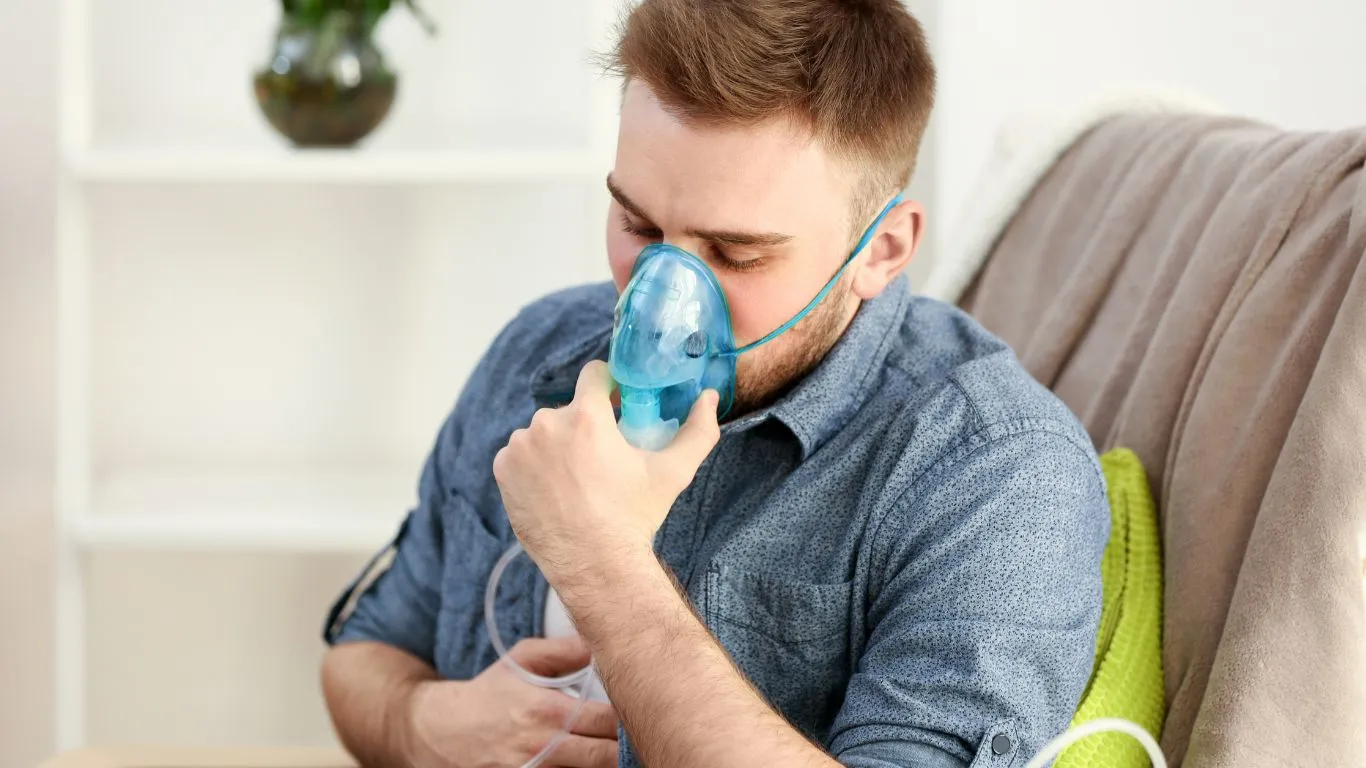Shocking Truth About Can Asthma Cause Gasping While Sleeping
If you’ve ever jolted awake in the middle of the night gasping for air, you’re not alone—and as a pulmonary nurse practitioner, I’ve had countless patients ask me, “Can asthma cause gasping while sleeping?” The short answer? Absolutely. And it’s more common than most people realize. While we often associate asthma with daytime wheezing or shortness of breath during activity, it can sneak up on you while you’re deep in dreamland, making nights just as disruptive as days.
What Happens to Your Airways While You Sleep?

Asthma doesn’t exactly punch out when you go to bed. In fact, for many people, symptoms can worsen at night. This phenomenon, known as nocturnal asthma, can lead to coughing, wheezing, tightness in the chest, and yes, gasping for air. Here’s why:
- Hormonal fluctuations: Certain hormones like cortisol drop at night, which can trigger airway inflammation.
- Body position: Lying flat can make it tougher to breathe, especially if there’s postnasal drip or acid reflux.
- Allergens: Dust mites, pet dander, or mold in the bedroom can silently trigger symptoms while you sleep.
- Cooler air: Breathing in cool air at night may constrict the airways, leading to nighttime flare-ups.
In my clinical experience, it’s not unusual for patients to describe these episodes as “feeling like I’m suffocating in my sleep.” It’s scary—and it’s real.
Can Asthma Cause Gasping While Sleeping? Yes, and Here’s Why

When your airways tighten or become inflamed during the night, your oxygen levels can dip. That drop can trigger your body’s natural “wake-up call”—an intense, panic-filled gasp. From what I’ve seen, these episodes often happen during the early hours of the morning, between 2 AM and 4 AM, when asthma symptoms typically peak.
What It Feels Like—And Why It’s Often Misdiagnosed
A lot of my patients have confused these nighttime gasping episodes with sleep apnea, and it’s easy to see why. Both can cause interrupted sleep and breathlessness. But here’s how you can often tell the difference:
- Asthma gasping usually comes with chest tightness, wheezing, or a lingering cough after waking up.
- Sleep apnea gasping tends to be more abrupt and followed by loud snoring or choking noises, without wheezing or a productive cough.
It’s so important to pay attention to these details—and to talk to a healthcare provider who’s experienced in respiratory health. I’ve had patients who went years misdiagnosed, thinking they just snored loudly or had bad dreams, when really, it was asthma throwing punches at 3 AM.
Real Talk: What My Patients Say About Nighttime Asthma

I remember one patient, a middle-aged mom named Linda, who told me, “I thought I was having panic attacks in my sleep.” Turns out, she was experiencing nocturnal asthma all along. After adjusting her asthma medication and adding a nighttime inhaler, those terrifying gasps became far less frequent.
Another young guy, Marcus, shared that he felt embarrassed to even talk about his gasping episodes. “I thought it was just anxiety,” he told me. But after a proper asthma evaluation and some home air quality improvements, he finally started sleeping through the night.
So if you’ve ever found yourself gasping awake at night, please know—it’s not in your head, and you’re not alone. Asthma doesn’t always play by the rules, and nighttime is when it can get sneaky.
How to Tell If Your Nighttime Gasping Is Asthma-Related

So let’s say you’ve had a few of those scary moments—waking up out of breath, feeling like you’re choking or suffocating. How do you know if it’s asthma and not something else? As someone who’s worked closely with asthma patients for years, I’ve learned to spot a few common signs that help point us in the right direction.
- You wake up coughing. Not just a little throat tickle—this is a deep, nagging cough that pulls you out of sleep.
- You hear wheezing. That high-pitched whistling sound while exhaling? It’s a big red flag.
- You feel chest tightness or heaviness. Some people describe it like an invisible weight pressing down on them.
- It happens around the same time each night. Asthma tends to be annoyingly predictable that way—many folks notice their worst symptoms around 2 to 4 AM.
If these symptoms sound familiar, it’s time to connect the dots. You might be dealing with nocturnal asthma, and that means it’s time to take action—because quality sleep isn’t just a luxury, it’s a necessity.
Triggers That Make You Gasp for Air While Sleeping

Now let’s get into the nitty-gritty: What exactly is setting your lungs off in the middle of the night? From what I’ve seen, many people aren’t even aware that their environment is working against them while they sleep. Here are some common culprits:
Bedroom Triggers You Might Be Overlooking
- Dust mites in bedding: These tiny critters love pillows and mattresses. Wash bedding weekly in hot water and invest in allergen-proof covers.
- Pet dander: As much as we love our fur babies, sleeping with them could be making your asthma worse.
- Mold in corners or vents: Especially in humid climates—check your A/C units and bathroom walls.
- Strong scents: Scented candles, plug-ins, or even laundry detergents can be powerful irritants for sensitive lungs.
- Cold, dry air: If you’re cranking the A/C or it’s wintertime, try a humidifier to keep airways from drying out.
In my own practice, I’ve had patients bring in photos of their bedrooms, and together we’d spot all sorts of asthma “landmines”—from carpeted floors to dusty ceiling fans. A few simple changes often made a huge difference in reducing nighttime gasping episodes.
Tips That Actually Work: Managing Asthma While You Sleep

Managing asthma is never one-size-fits-all, but there are several tried-and-true strategies that I regularly recommend to my patients. These aren’t gimmicks—they’re grounded in both experience and science.
Bedtime Routine Tweaks That Help
- Use your inhaler before bed (if prescribed): A controller inhaler at night can prevent airway inflammation while you sleep.
- Elevate your head slightly: This helps with drainage and reduces pressure on your chest—especially helpful if acid reflux is also a trigger.
- Run an air purifier: A good HEPA filter can work wonders in cutting down airborne allergens.
- Keep pets off the bed: I know, it’s tough—I’ve had to break this news to lots of fellow pet lovers—but it really does make a difference.
- Track your symptoms in a journal: Jot down when you wake up gasping, what you ate, how the air felt. Patterns start to emerge surprisingly fast.
I always tell my patients: You have more control than you think. Gasping while sleeping doesn’t have to be your norm. I’ve seen people go from waking up five times a night to sleeping soundly all the way through just by dialing in their routines and meds.
When to Talk to Your Provider
If your nighttime symptoms are happening more than twice a week, or if you’re regularly using a rescue inhaler to make it through the night, that’s your body waving a red flag. Don’t ignore it. A simple adjustment to your asthma treatment plan—like adding a long-acting bronchodilator or tweaking your dosage—might make all the difference.
One of my long-time patients, Raul, used to dread bedtime. He kept an inhaler under his pillow because he knew what was coming. After a medication review and a few environmental changes, he now tells me, “I actually look forward to sleep again.” That’s the kind of progress we love to see—and it’s absolutely possible.
Long-Term Strategies to Prevent Nighttime Gasping from Asthma

By now, you probably realize that asthma causing gasping while sleeping isn’t just a random event—it’s a sign your lungs need ongoing care and attention. From my years as a pulmonary nurse practitioner, I can tell you the key to conquering nighttime symptoms lies in consistent, proactive management. Here are some strategies that go beyond just quick fixes.
Stick to Your Asthma Action Plan
This might sound like a no-brainer, but honestly, it’s surprising how many patients don’t have a clear asthma action plan or drift away from it over time. Your plan is your roadmap, tailored specifically to your triggers, symptoms, and lifestyle. It includes when to take your medications, what to do during flare-ups, and when to seek medical help.
Over the years, I’ve worked with patients who improved dramatically just by following their personalized plan consistently. The biggest hurdle? Remembering to take daily controller meds even when feeling good. It’s like brushing your teeth—skip a day or two, and problems start piling up.
Regular Check-Ins and Lung Function Tests
Asthma isn’t a “set it and forget it” condition. Your lung function and triggers can change over time. That’s why regular visits with your healthcare provider are essential. Spirometry tests and peak flow monitoring give concrete data to track your progress and catch any early signs of worsening symptoms.
One patient of mine, Carla, was shocked to discover her asthma was worsening despite feeling “mostly fine.” After adjusting her medications based on her lung tests, she stopped waking up gasping and started feeling more energetic during the day.
The Role of Lifestyle in Managing Asthma and Nighttime Symptoms

Sometimes we focus so much on medications that we forget lifestyle plays a huge role in asthma control. From what I’ve seen firsthand, making simple daily changes can seriously reduce the frequency of those scary gasping episodes at night.
Exercise Smartly
Physical activity is a double-edged sword for asthma sufferers. Exercise can strengthen your lungs and improve overall health, but it can also trigger symptoms if not managed properly. I always recommend warming up slowly and carrying your rescue inhaler if needed.
Interestingly, patients who maintain a regular, tailored exercise routine often report fewer nighttime symptoms. The key is balancing activity with rest and avoiding known triggers.
Manage Stress and Anxiety
Emotional health can’t be overlooked. Stress and anxiety can tighten your chest and make asthma worse, sometimes leading to the dreaded gasping at night. Over the years, I’ve encouraged patients to explore mindfulness, breathing exercises, or even professional counseling if needed.
One of my patients found that just 10 minutes of deep breathing before bed drastically reduced her nighttime awakenings. It’s a small habit with a big payoff.
Nutrition and Weight Control
There’s growing evidence linking obesity and poor asthma control. Excess weight can increase inflammation and pressure on your lungs, making nighttime symptoms more likely. I usually advise patients to eat a balanced diet rich in antioxidants—think colorful fruits and veggies—and to maintain a healthy weight.
It’s never easy, but even modest weight loss can improve breathing and reduce medication needs.
When to Seek Emergency Help
Gasping for air is frightening, and sometimes it can become an emergency. Knowing when to get urgent care can save your life.
- If your rescue inhaler doesn’t relieve symptoms within 15-20 minutes.
- If your lips or face start to turn blue.
- If you’re struggling to speak or feel lightheaded.
- If your breathing is very fast and shallow or you’re using extra muscles to breathe.
I always stress this in my practice: trust your instincts. If you feel seriously unwell, don’t hesitate to seek immediate medical attention.
Final Thoughts on Asthma and Nighttime Gasping
From my clinical experience, the question “Can asthma cause gasping while sleeping?” isn’t just theoretical—it’s a reality that can deeply impact quality of life. But with the right awareness, management, and support, it’s absolutely possible to regain restful nights.
If you or someone you know struggles with nighttime asthma symptoms, I encourage you to speak with a healthcare provider who specializes in lung health. Your sleep—and your lungs—will thank you.
References
Disclaimer
This article is for informational purposes only and is not a substitute for professional medical advice, diagnosis, or treatment. Always seek the advice of your physician or other qualified health provider with any questions you may have regarding a medical condition.

Bianca Nala is a compassionate Nurse Practitioner with a strong background in primary and respiratory care. As a health writer for Healthusias.com, she combines her clinical expertise with a talent for clear, relatable storytelling to help readers better understand their health. Bianca focuses on topics like asthma, COPD, chronic cough, and overall lung health, aiming to simplify complex medical topics without losing accuracy. Whether she’s treating patients or writing articles, Bianca is driven by a single goal: making quality healthcare knowledge accessible to everyone.







